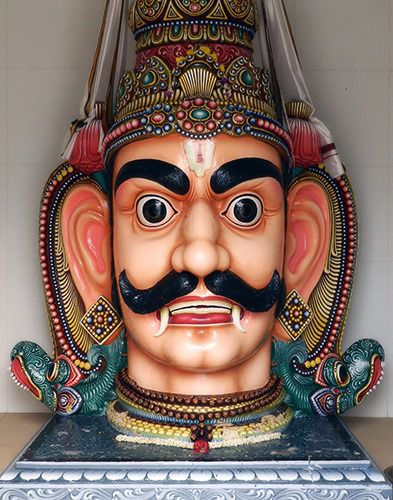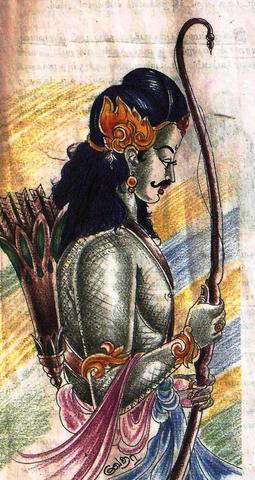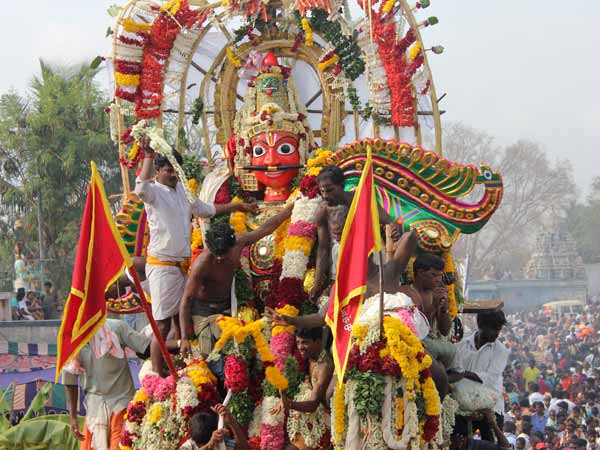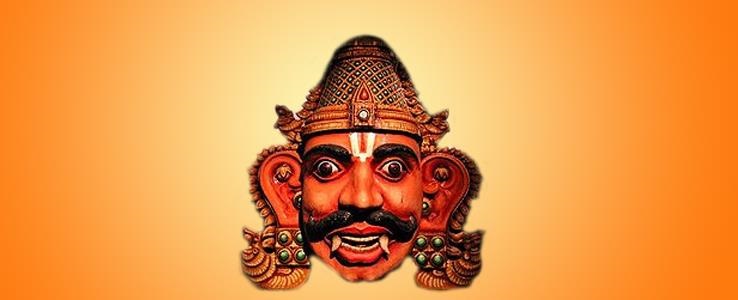No products in the cart.
Iravan, the son of Arjuna, is one of the lesser known characters mentioned in the epic Mahabharata. Nonetheless, he is worshiped by devotees across India. Also known as Iravat/ Iravant, and Aravat, this grandson of Pandu is particularly worshiped in South India, by the Tamil cult of Kuttantavar and the Draupadi cult.
Iravan was the son of Arjuna and his consort Ulupi, the Naga princess. Iravan’s parentage is mentioned in the Adi Parva of Mahabharata. As described in Srimad Bhagavatam 1.12.21, Arjuna married four wives: Draupadi, Subhadra, Citrangada and Ulupi. From them, he got four sons by the names Srutakirti, Abhimanyu, Babhruvahana and Iravan, respectively. Arjuna met Ulupi at Haridvara (Hardwar), where he was attracted by the girl belonging to Nagaloka, and thus Iravan was born. In the same way he met Citrangada, a daughter of the King of Manipura, and thus Babhruvahana was born.

The birth of Iravan to Arjuna and Ulupi is almost mentioned in Srimad Bhagavatam 9.22:
“Dhritharastra had one hundred sons, headed by Duryodhana, and one daughter named Duhsala. Pandu had five sons, headed by Yudhisthira, and each of these five sons had one son from Draupadi. The names of these five sons of Draupadi, called Upapandavas, were Prativindhya, Srutasena, Srutakirti, Satanika and Srutakarma. Besides these five sons, by other wives the Pandavas had many other sons, such as Devaka, Ghatotkacha, Sarvagata, Suhotra, Naramitra, Iravan, Babhruvahana and Abhimanyu. From Abhimanyu, Maharaja Pariksit was born, and Maharaja Pariksit had four sons–Janamejaya, Srutasena, Bhimasena and Ugrasena.”
The story of Iravan in the vedic texts of Mahabharatha goes as follows.
After their thirteen years stay out of their kingdom, the Pandavas return back. And as per their deal, they were supposed to get back their kingdom. They sent Krishna to talk to Dhuryodhana (eldest of the Kauravas), who was ruling the kingdom in the absence of Pandavas. However, Dhuryodhana, despite being reminded of their deal, refused to give them back their kingdom. He also said that the only way that the Pandavas could get hold of their kingdom was to fight a war. Krishna, realizing that they is no other way, but to accept the war, told the Pandavas to go ahead with their preparation for war.
As per rituals, before a war, they are supposed to do a narabali (human sacrifice). The person to be sacrificed should be someone who has 32 lakshanam (morals/characters). There were only three people who fit into that category – Krishna, Arjuna and Arjuna’s son Aravan.
 It was impossible to sacrifice Krishna. Arjuna, on the other hand, is an archery specialist. Sacrificing him would mean losing the war. The only other possibility left was Aravan. Aravan agreed to himself being sacrificed, however, requested that he wanted to die only in battle front. Krishna grants him this request. To ensure that he doesn’t die a virgin, he is also married before he sacrifices himself.
It was impossible to sacrifice Krishna. Arjuna, on the other hand, is an archery specialist. Sacrificing him would mean losing the war. The only other possibility left was Aravan. Aravan agreed to himself being sacrificed, however, requested that he wanted to die only in battle front. Krishna grants him this request. To ensure that he doesn’t die a virgin, he is also married before he sacrifices himself.
And so, Aravan sacrifices himself – cutting him into 32 body parts and offering to Goddess Kali. Goddess Kali appears in front of them and blesses them to a victorious battle. And as per granted, Aravan’s body comes back together and he eventually dies a victorious death on the battleground.
This sacrifice was supposed to be done on amavasya (new moon day). Sahadev, one of the Pandavas, who is well-known for his astrology, chooses this date. And whoever does this sacrifice, whether Pandavas or Kouravas, will get more benefits, which could ensure that they win the battle. So, to ensure that the Pandavas win the battle, Lord Krishna comes up with a plan.
He does special prayers for his late father (known as tharpanam) a day before amavasya. By right, this is supposed to be done on the day of amavasya. Seeing this, the Moon god and the Sun god got very much confused. They decided to confront Krishna and appear before him. They question his actions, asking him why he is doing tharpanam a day before, instead of on a amavsya. He questions that back, asking them “what does it mean by amavasya”, to which they reply “the coming together of the moon and the sun”. He then tells them, “aren’t you both together now? So doesn’t that mean that today is amavasya?”. Knowing that Krishna is up to something, they left without a response.
Also, the start of the battle is signified by the Trishul and the yellow cloth tied around it, being planted near the Aravan sanctum. It is planted by Draupadi.

Temple volunteers re-enact scenes from the Mahabharath throughout this Theemithi period, where a male dresses himself up as Draupadi and the roles of Krishna and the five Pandavas are also carried out. The Pandavas can be recognized by the swords that they hold.
The South India cults that worship Iravan put great focus on a pastime in which he died a heroic death during the 18-day Battle of Kurukshetra. With great ceremony they honor Aravan’s self-sacrifice to the goddess Kali, which he is said to have enacted in order to ensure her favour and thus bring victory for the Pandavas. According to Kuttantavar legend, Lord Krishna awarded three boons to Aravan for this self-sacrifice. One of these boons the Lord satisfied in His female form of Mohini, who became married to Aravan. This pastime is re-enacted in Tamil Nadu with an 18-day festival. First there is a ceremonial marriage, then a celebration of their widowhood following the ritual re-enactment of Aravan’s sacrifice.






